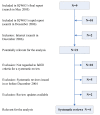Disagreement in primary study selection between systematic reviews on negative pressure wound therapy
- PMID: 18582373
- PMCID: PMC2496910
- DOI: 10.1186/1471-2288-8-41
Disagreement in primary study selection between systematic reviews on negative pressure wound therapy
Abstract
Background: Primary study selection between systematic reviews is inconsistent, and reviews on the same topic may reach different conclusions. Our main objective was to compare systematic reviews on negative pressure wound therapy (NPWT) regarding their agreement in primary study selection.
Methods: This retrospective analysis was conducted within the framework of a systematic review (a full review and a subsequent rapid report) on NPWT prepared by the Institute for Quality and Efficiency in Health Care (IQWiG). For the IQWiG review and rapid report, 4 bibliographic databases (MEDLINE, EMBASE, The Cochrane Library, and CINAHL) were searched to identify systematic reviews and primary studies on NPWT versus conventional wound therapy in patients with acute or chronic wounds. All databases were searched from inception to December 2006. For the present analysis, reviews on NPWT were classified as eligible systematic reviews if multiple sources were systematically searched and the search strategy was documented. To ensure comparability between reviews, only reviews published in or after December 2004 and only studies published before June 2004 were considered. Eligible reviews were compared in respect of the methodology applied and the selection of primary studies.
Results: A total of 5 systematic reviews (including the IQWiG review) and 16 primary studies were analysed. The reviews included between 4 and 13 primary studies published before June 2004. Two reviews considered only randomised controlled trials (RCTs). Three reviews considered both RCTs and non-RCTs. The overall agreement in study selection between reviews was 96% for RCTs (24 of 25 options) and 57% for non-RCTs (12 of 21 options). Due to considerable disagreement in the citation and selection of non-RCTs, we contacted the review authors for clarification (this was not initially planned); all authors or institutions responded. According to published information and the additional information provided, most differences between reviews arose from variations in inclusion criteria or inter-author study classification, as well as from different reporting styles (citation or non-citation) for excluded studies.
Conclusion: The citation and selection of primary studies differ between systematic reviews on NPWT, particularly with regard to non-RCTs. Uniform methodological and reporting standards need to be applied to ensure comparability between reviews as well as the validity of their conclusions.
Figures
Similar articles
-
Negative pressure wound therapy for treating pressure ulcers.Cochrane Database Syst Rev. 2023 May 26;5(5):CD011334. doi: 10.1002/14651858.CD011334.pub3. Cochrane Database Syst Rev. 2023. PMID: 37232410 Free PMC article. Review.
-
Negative pressure wound therapy for surgical wounds healing by primary closure.Cochrane Database Syst Rev. 2020 May 1;5(5):CD009261. doi: 10.1002/14651858.CD009261.pub5. Cochrane Database Syst Rev. 2020. Update in: Cochrane Database Syst Rev. 2020 Jun 15;6:CD009261. doi: 10.1002/14651858.CD009261.pub6. PMID: 32356396 Free PMC article. Updated.
-
Bias due to selective inclusion and reporting of outcomes and analyses in systematic reviews of randomised trials of healthcare interventions.Cochrane Database Syst Rev. 2014 Oct 1;2014(10):MR000035. doi: 10.1002/14651858.MR000035.pub2. Cochrane Database Syst Rev. 2014. PMID: 25271098 Free PMC article.
-
Methodological developments in searching for studies for systematic reviews: past, present and future?Syst Rev. 2013 Sep 25;2:78. doi: 10.1186/2046-4053-2-78. Syst Rev. 2013. PMID: 24066664 Free PMC article.
-
Negative pressure wound therapy for surgical wounds healing by primary closure.Cochrane Database Syst Rev. 2019 Mar 26;3(3):CD009261. doi: 10.1002/14651858.CD009261.pub4. Cochrane Database Syst Rev. 2019. Update in: Cochrane Database Syst Rev. 2020 May 1;5:CD009261. doi: 10.1002/14651858.CD009261.pub5. PMID: 30912582 Free PMC article. Updated.
Cited by
-
The effects of excluding treatments from network meta-analyses: survey.BMJ. 2013 Sep 5;347:f5195. doi: 10.1136/bmj.f5195. BMJ. 2013. PMID: 24009242 Free PMC article.
-
Methods for Developing Evidence Reviews in Short Periods of Time: A Scoping Review.PLoS One. 2016 Dec 8;11(12):e0165903. doi: 10.1371/journal.pone.0165903. eCollection 2016. PLoS One. 2016. PMID: 27930662 Free PMC article.
-
The Impact of Excluding Trials from Network Meta-Analyses - An Empirical Study.PLoS One. 2016 Dec 7;11(12):e0165889. doi: 10.1371/journal.pone.0165889. eCollection 2016. PLoS One. 2016. PMID: 27926924 Free PMC article.
-
Role of technology assessment in orthopaedics.Clin Orthop Relat Res. 2009 Oct;467(10):2570-6. doi: 10.1007/s11999-009-0859-x. Epub 2009 Apr 30. Clin Orthop Relat Res. 2009. PMID: 19404712 Free PMC article.
-
Overlapping meta-analyses on the same topic: survey of published studies.BMJ. 2013 Jul 19;347:f4501. doi: 10.1136/bmj.f4501. BMJ. 2013. PMID: 23873947 Free PMC article.
References
-
- Jadad AR, Cook DJ, Browman GP. A guide to interpreting discordant systematic reviews. CMAJ. 1997;156:1411–1416. http://www.cmaj.ca/cgi/reprint/156/10/1411?ck=nck - PMC - PubMed
-
- Furlan AD, Clarke J, Esmail R, Sinclair S, Irvin E, Bombardier C. A critical review of reviews on the treatment of chronic low back pain. Spine. 2001;26:E155–E162. - PubMed
-
- Hoving JL, Gross AR, Gasner D, Kay T, Kennedy C, Hondras MA, Haines T, Bouter LM. A critical appraisal of review articles on the effectiveness of conservative treatment for neck pain. Spine. 2001;26:196–205. - PubMed
-
- Jadad AR, McQuay HJ. Meta-analyses to evaluate analgesic interventions: a systematic qualitative review of their methodology. J Clin Epidemiol. 1996;49:235–243. - PubMed
Publication types
MeSH terms
LinkOut - more resources
Full Text Sources



